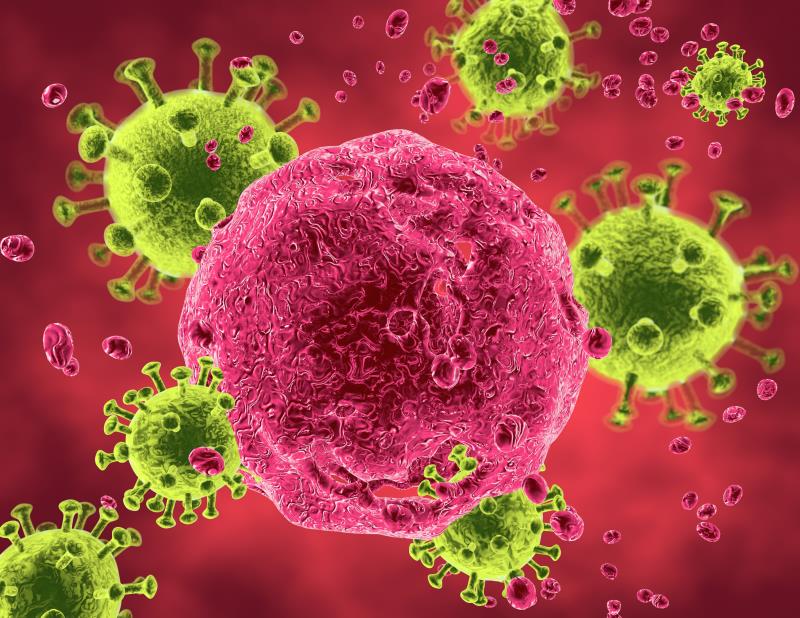HIV does not worsen COVID-19 outcomes





People living with HIV (PLWH) who are hospitalized for COVID-19 are not more likely to die than those without HIV despite having comorbidities associated with worse COVID-19 outcomes, a US study has shown.
“We found no differences in adverse outcomes associated with HIV infection in hospitalized COVID-19 patients vs a demographically similar patient group,” said lead study author Prof Keith Sigel from the Icahn School of Medicine at Mount Sinai, New York City, US. “We don’t see any signs that people with HIV should take extra precautions to protect themselves from COVID-19.”
Sigel said he and his team had no good explanation for these findings but were happy to have seen such results.
Risk no greater with HIV
Knowing there is no increased risk gives him that renewed confidence when counselling patients. “I am now comfortable telling them: Wear a mask, practice appropriate social distancing and hygiene, your risk doesn’t appear to be greater than others,” Sigel said. “There’s no reason to live in fear that having HIV is causing you to be more likely to die from COVID-19.”
The study echoes findings from a cohort study in Spain and a case study in China showing no association between HIV and COVID-19 severity. [Clin Infect Dis 2020;doi:10.1093/cid/ciaa880; J Med Virol 2020;92:529-530]
However, this doesn’t hold true for South Africa where data showed HIV is the third most common comorbidity tied to mortality from COVID-19. PLWH in this side of the world had twice the risk of deaths from COVID-1 irrespective of viral suppression or ART use. [https://www.nicd.ac.za/wp-content/uploads/2020/06/COVID-19-Special-Public-Health-Surveillance-Bulletin-22-June-2020.pdf]
No difference in deaths, heart failure
This was a stark contrast to Sigel and team’s findings which demonstrated that in PLWH with a median age of 61 years, who were more likely to have COPD, cirrhosis, and cancer history, there was no difference in deaths from COVID-19. “This was a patient group we would suspect to do worse, yet they didn’t,” he said. There was neither any difference in the incidence of respiratory failure.
In fact, there were even less PLWH who required mechanical ventilation than those without HIV (18 percent vs 23 percent). During follow-up, one in five patients died from COVID-19 whether they had HIV or not (21 percent vs 20 percent). History of organ transplantation was the lone risk factor tied to worse outcomes which, Sigel explained, could be because non-HIV causes of immunodeficiency may be more important risks for worse outcomes.
Better outcomes in those taking tenofovir
Another interesting finding was from a recent study which demonstrated a slight association between the use of nucleos(t)ide reverse-transcriptase inhibitors (NRTIs) in those with HIV and better outcomes. People with HIV taking the combination of tenofovir disoproxil fumarate plus emtricitabine (TDF/FTC) were less likely to be diagnosed with COVID-19, less likely to be hospitalized, and less likely to die. [Ann Intern Med 2020;doi.org/10.7326/M20-3689]
Sigel however cautioned that that the study was not remotely designed to prove that NRTIs are protective against COVID-19.
The study included 77,590 HIV-positive individuals receiving ART at HIV clinics in 60 Spanish hospitals from February 1 to April 15, 2020. Of these, 236 had COVID-19, 151 were hospitalized, 15 were admitted to the ICU, and 20 died.
The risks for COVID-19 diagnosis and hospitalization were greater in men and those >70 years of age.
Among those receiving tenofovir alafenamide/FTC (TAF/FTC), the risk for COVID-19 hospitalization was 20.3. It was 10.5 in those receiving TDF/FTC, and 23.4 in those receiving abacavir/lamivudine (ABC/3TC), whereas 20.0 in those receiving other regimens.
The risks for COVID-19 diagnosis were 39.1, 16.9, 28.3, and 29.7, respectively. No patient receiving TDF/FTC was admitted to the ICU or died.
Siegel said this makes researchers, including himself, ponder if NRTIs have some effects on SARS-CoV-2, the virus that causes COVID-19.
“This study sets the foundation for future studies in larger cohorts so we can appropriately address treatment of COVID-19 in patients with HIV,” he added.
This and other updates on where infectious disease experts stand at in the control of HIV during COVID-19 time were hot topics at AIDS 2020 along with HIV prevention and treatment trials.
PLWH still a high-risk group
As for the South African data, people with HIV had a modestly increased risk of COVID-19 deaths vs HIV-negative patients (adjusted hazard ratio [adjHR], 1.78). A small proportion (<10 percent) of all COVID-19 deaths in Western Cape province were attributable to HIV. Similarly, older age, male sex, diabetes, CKD, and other comorbidities were tied to increased COVID-19 deaths. [https://www.nicd.ac.za/wp-content/uploads/2020/06/COVID-19-Special-Public-Health-Surveillance-Bulletin-22-June-2020.pdf]
“While these findings may overestimate the effect of HIV on COVID-19 deaths due to the presence of residual confounding, PLWH should be considered a high-risk group for COVID-19 management, with modestly elevated risk of poor outcomes, irrespective of viral suppression, and especially if they have other comorbidities,” said researchers from the Western Cape Department of Health, South Africa.